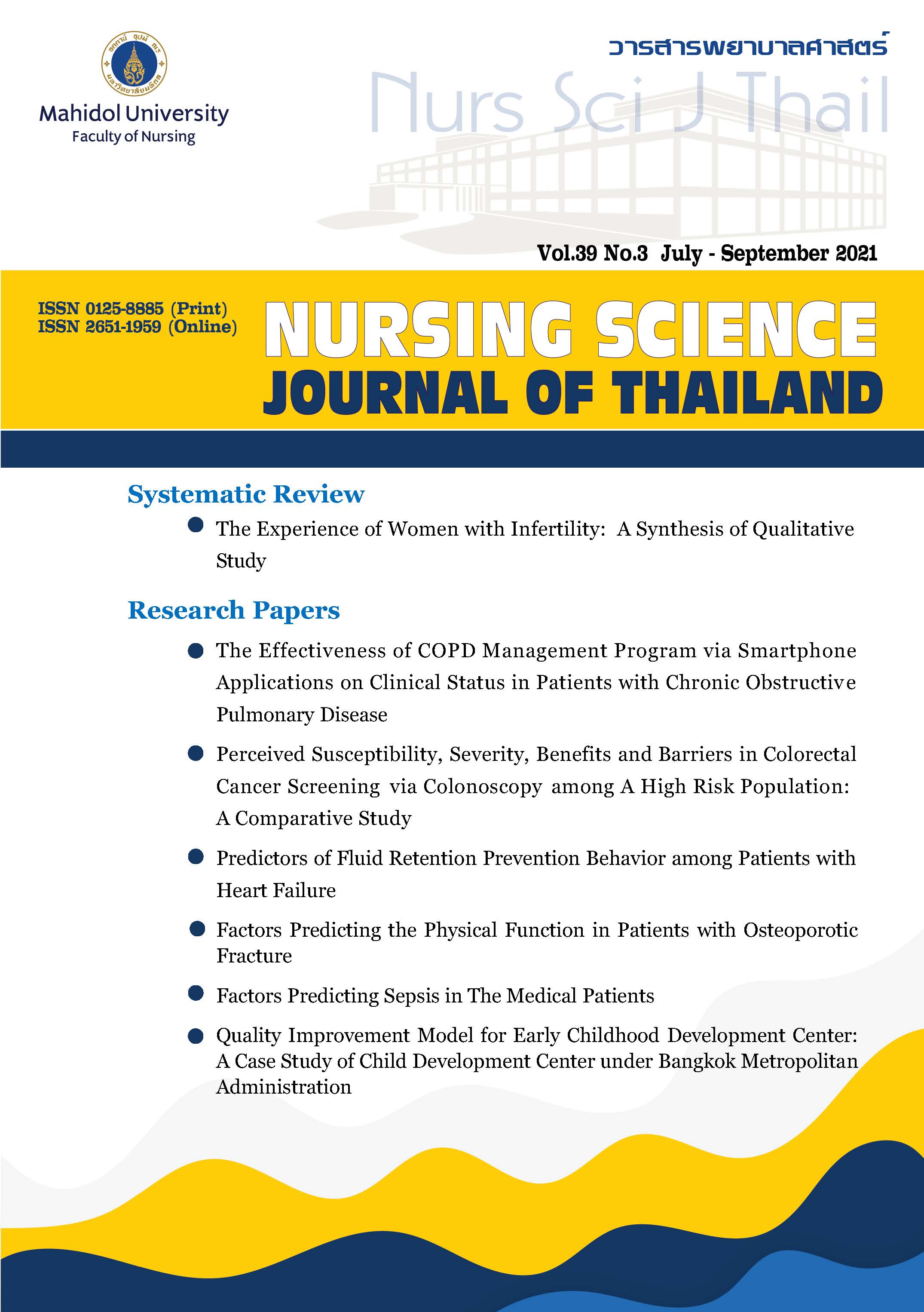The Experience of Women with Infertility A Synthesis of Qualitative Study
Main Article Content
Abstract
Purpose: The objective of this study was to review and perform meta-synthesis of studies to study experiences, coping and care needs of infertile women.
Design: This study is a systematic review and synthesis of qualitative studies by searching for studies published in January 2015 to May 2020 from the PubMed, MEDLINE, Academic Search Complete, Nursing & Allied Health Database (ProQuest), Scopus and Web of Science databases. The main search keywords were “experience”, “infertility”, “qualitative study” and “women”. Two authors independently assessed article quality, analyzed to identify themes and synthesize to obtain new meaning.
Research findings: Out of 17 qualitative studies, experiences of women with infertility were found to have five issues: the nature of being infertile women, coping and managing infertility problems, negative reactions from surrounding people perceived by women, effects on relationships and health care needs.
Conclusion and recommendations: Infertile women experience unseen feelings of loss, self-blame, perceived negative reactions from family and the people around them, lack adequate support from healthcare professionals, particularly in the psychological area. Therefore, families, friends and healthcare professionals are essential to providing support and empowerment for women to enable infertile women to properly overcome this suffering.
Article Details
Copyright Notice: Nursing Science Journal of Thailand has exclusive rights to publish and distribute the manuscript and all contents therein. Without the journal’s permission, the dissemination of the manuscript in another journal or online, and the reproduction of the manuscript for non-educational purpose are prohibited.

Disclaimer: The opinion expressed and figures provided in this journal, NSJT, are the sole responsibility of the authors. The editorial board bears no responsibility in this regard.
References
Mascarenhas MN, Cheung H, Mathers CD, Stevens GA. Measuring infertility in populations: constructing a standard definition for use with demographic and reproductive health surveys. Popul Health Metr. 2012;10(1): 17. doi: 10.1186/1478-7954-10-17.
Mascarenhas MN, Flaxman SR, Boerma T, Vanderpoel S, Stevens GA. National, regional, and global trends in infertility prevalence since 1990: a systematic analysis of 277 health surveys. PLoS Med. 2012;9(12):e1001356. doi: 10.1371/journal.pmed.1001356.
Centers for Disease Control and Prevention. Key statistics from the nations survey of family growth [Internet]. Hyattsville, MD: National Center for Health Statistics; 2017 [cited 2021 Jan 6]. Available from: https://www.cdc.gov/nchs/nsfg/key_statistics/i_2015-2017.htm#infertility.
United Nations Population Fund, Office of the National Economic and Social Development Council. Thai population situation report 2016 [Internet]. Bangkok: United Nations Population Fund (UNFPA); 2015 [cited 2021 Apr 15]. Available from: https://thailand.unfpa.org/sites/default/files/pub-pdf/State%20of%20Thailand%20Population%20report%202015-Thai%20Family_th.pdf. (in Thai).
Adamson GD, de Mouzon J, Chambers GM, Zegers-Hochschild F, Mansour R, Ishihara O, et al. International Committee for Monitoring Assisted Reproductive Technology: world report on assisted reproductive technology, 2011. Fertil Steril. 2018;110(6):1067-80. doi: 10.1016/j.fertnstert.2018.06.039.
Ali S, Sophie R, Imam AM, Khan FI, Ali SF, Shaikh A, et al. Knowledge, perceptions and myths regarding infertility among selected adult population in Pakistan: a cross-sectional study. BMC Public Health. 2011;11:760. doi: 10.1186/1471-2458-11-760.
Sezgin H, Hocaoglu C, Guvendag-Guven ES. Disability, psychiatric symptoms, and quality of life in infertile women: a cross-sectional study in Turkey. Shanghai Arch Psychiatry. 2016;28(2):86-94. doi: 10.11919/j.issn.1002-0829.216014.
Berger R, Paul MS, Henshaw LA. Women's experience of infertility: a multi-systemic perspective. J Int Womens Stud. 2013;14(1):54-68.
Romeiro J, Caldeira S, Brady V, Timmins F, Hall J. Spiritual aspects of living with infertility: a synthesis of qualitative studies. J Clin Nurs. 2017;26(23-24):3917-35. doi: 10.1111/jocn.13813.
Güneri SE, Kavlak O, Göker ENT. Hope and hopelessness in Infertile women: phenomenological study. Psikiyatride Guncel Yaklasimlar. 2019;11 Suppl 1:24-36. doi: 10.18863/pgy.530714.
Pedro A. Coping with Infertility: an explorative study of South African women’s experiences. Open J Obstet Gynecol. 2015;5(1):49-59. doi: 10.4236/ojog.2015.51008.
Aghakhani N, Marianne Ewalds-Kvist B, Sheikhan F, Merghati Khoei E. Iranian women's experiences of infertility: a qualitative study. Int J Reprod Biomed. 2020;18(1):65-72. doi: 10.18502/ijrm.v18i1.6203.
McBain TD, Reeves P. Women’s experience of infertility and disenfranchised grief. The Family Journal. 2019;27(2):156-66. doi: 10.1177/1066480719833418.
Yao H, Chan CHY, Chan CLW. Childbearing importance: a qualitative study of women with infertility in China. Res Nurs Health. 2018;41(1):69-77. doi: 10.1002/nur.21846.
Naab F, Lawali Y, Donkor ES. "My mother in-law forced my husband to divorce me": experiences of women with infertility in Zamfara State of Nigeria. PLoS One. 2019;14(12):e0225149. doi: 10.1371/journal.pone.0225149.
Ying L-Y, Wu LH, Loke AY. The experience of Chinese couples undergoing in vitro fertilization treatment: perception of the treatment process and partner support. PLoS One. 2015;10(10):e0139691. doi: 10.1371/journal.pone.0139691.
Ebrahimzadeh Zagami S, Latifnejad Roudsari R, Janghorban R, Mousavi Bazaz SM, Amirian M, Allan HT. Infertile couples' needs after unsuccessful fertility treatment: a qualitative study. J Caring Sci. 2019;8(2):95-104. doi: 10.15171/jcs.2019.014.
Pedro A, Faroa BD. Exploring the lived experiences of infertility treatment and care by involuntarily childless women. J Psychol Afr. 2017;27(3):267-72. doi: 10.1080/14330237.2017.1321855.
Born SL, Carotta CL, Ramsay-Seaner K. A multicase study exploring women’s narratives of infertility:
implications for counselors. The Qualitative Report. 2018;23(12):2992-3003.
Zhuoran W, Wanpeng L, Tao P, Coates R. Qualitative research on infertile Chinese couples' understanding of sexuality. Fam Pract. 2018;35(1):88-92. doi: 10.1093/fampra/cmx069.
Batool SS, de Visser RO. Experiences of infertility in British and Pakistani women: a cross-cultural qualitative analysis. Health Care Women Int. 2016;37(2):180-96. doi: 10.1080/07399332.2014.980890.
Akarsu RH, Beji NK. Spiritual and religious issues of stigmatization women with infertility: a qualitative study: spiritual and religious issues of stigmatization. J Relig Health. 2019:60(1):256-67. doi: 10.1007/s10943-019-00884-w.
Boz I, Okumus H. The “everything about the existence” experiences of Turkish women with infertility: solicited diaries in qualitative research. J Nurs Res. 2017;25(4):268-75. doi: 10.1097/JNR.0000000000000166.
Hasanpoor-Azghdy SB, Simbar M, Vedadhir A. The social consequences of infertility among Iranian women: a qualitative study. Int J Fertil Steril. 2015;8(4):409-20. doi: 10.22074/ijfs.2015.4181.
Ranjbar F, Behboodi-Moghadam Z, Borimnejad L, Ghaffari SR, Akhondi MM. Experiences of infertile women seeking assisted pregnancy in Iran: a qualitative study. J Reprod Infertil. 2015;16(4):221-8.
Dierickx S, Rahbari L, Longman C, Jaiteh F, Coene G. 'I am always crying on the inside': a qualitative study on the implications of infertility on women's lives in urban Gambia. Reprod Health. 2018;15(1):151. doi: 10.1186/s12978-018-0596-2.

